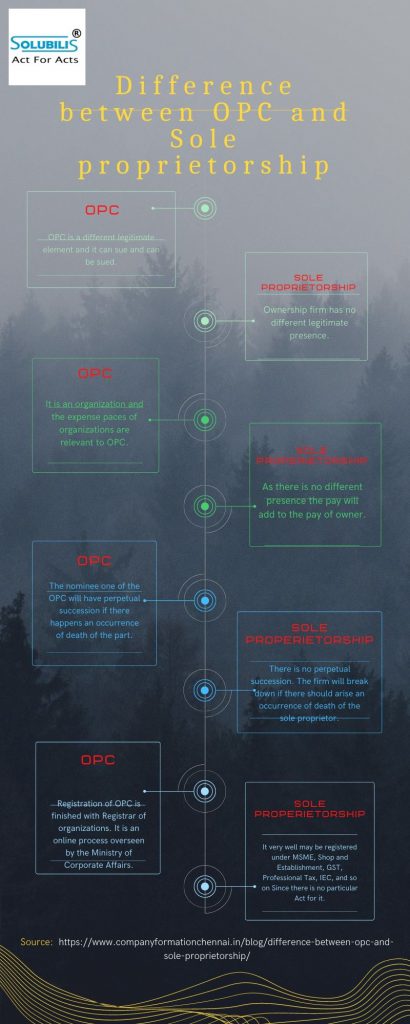The One Person Company (ordinarily known as OPC) is the kind of substance which has the possession by a solitary individual. It permits a sole individual to claim and furthermore deal with the whole business activities. The OPC as a business structure has presentation in India through Companies Act, 2013 to control the ownership organizations and advance in a coordinated manner. This is the construction which gives the advantages of corporate design to the individuals who needs no parcel to business proprietorship. In this way, it has contrasted with sole ownership firm because of possession and control viewpoints.
Sole proprietorship
The sole proprietorship has minimal difficulties in the business structure under which one can work a business. The sole ownership is certainly not a lawful substance. It essentially alludes to an individual who claims the business and is actually answerable for its obligations. A sole ownership can work under the name of its proprietor or it can work together under an invented name, like Nancy’s Nail Salon. The invented name is essentially a trademark – it doesn’t make a legitimate substance separate from the sole owner proprietor.
Since a sole proprietorship is undefined from its proprietor, sole ownership tax assessment is very straightforward. The pay acquired by a sole ownership has pay procured by its proprietor. A sole owner reports the sole ownership pay or potentially misfortunes and costs by rounding out and recording a Schedule C, alongside the standard Form 1040. Your benefits and misfortunes have first recorded on a tax document called Schedule C, which has documentation alongside your 1040. At that point the “bottom line amount” from Schedule C has moved to your own government form. This viewpoint is appealing on the grounds that business misfortunes you experience the ill effects of different sources.

Background for OPC
In the year 2005, J.J. Irani Committee presented its report on Company Law. The report brought up the requirement for a system for little organizations, and their commitment to the economy. It further expressed that in view of their size they couldn’t have troubled with similar degree of consistence necessities as huge public-recorded ventures.
The report expressed that it would not be sensible to expect that each business visionary who is fit for building up his thoughts and taking part in the commercial center ought to get it done through a relationship of people. Besides, it noticed that such elements might be furnished with a less complex system through exclusions so the single business visionary isn’t constrained to squander his time, energy and assets on procedural issue.
In light of these proposals, the idea of One Person Company presented in the Companies Act, 2013. Be that as it may, the previously mentioned Act holds a few limitations on the guidelines overseeing One Person Company which have been loose in the Union Budget 2021-22.
Difference between OPC and Sole proprietorship
| One Person Company | Sole proprietorship | |
| Separate Legal entity | OPC is a different legitimate element and it can sue and can be sued. | Ownership firm has no different legitimate presence. |
| Liability of Owner | The liability is limited up to the settled up share capital of the organization. | The obligation isn’t limited up to the asset put resources into the firm. If necessary, individual resources can likewise be utilized to reimburse the sum. |
| Number of Directors | Minimum 1 Director is required and a limit of 15 directors can be there in OPC. | Concept of a director in a proprietorship firm in not present. The sole owner is the solitary individual included. |
| Succession | The nominee one of the OPC will have perpetual succession if there happens an occurrence of death of the part. | There is no perpetual succession. The firm will break down if there should arise an occurrence of death of the sole proprietor. |
| Registration | Registration of OPC is finished with Registrar of organizations. It is an online process overseen by the Ministry of Corporate Affairs. | It very well may be registered under MSME, Shop and Establishment, GST, Professional Tax, IEC, and so on Since there is no particular Act for it. |
| Lock-in Period | To change over OPC into a Private limited company or Public limited company, a base 2 years should pass besides in determined case as given in Act. | No base lock-in period to change over an ownership firm to some other element. |
| Constitutional documents | The Company will work as indicated by its protected archives. The Memorandum of Association and Articles of Association are viewed as its established document. | It is overseen without any help and not represented by any ACT so it won’t need any such report. |
| Unique name | OPC will have a unique name. It is unique in relation to some other substance. What’s more, some other individual can’t utilize a comparative name for its business. One can check it online through the MCA entryway. | One can begin firm with any name. It can make disarray for the client if the names of firms are comparable. |
| Compliance | As it is represented by the Companies Act, the consistence’s are more when contrasted with ownership firm. Yet, there is less consistence when contrasted with different kinds of organizations. | There is no obligatory consistence other than recording a personal assessment form. Anyway one needs to consent to different Acts as material, like GST. |
| Taxability | It is an organization and the expense paces of organizations are relevant to OPC. | As there is no different presence the pay will add to the pay of owner. The owner is obligated for charge according to the expense chunk of an Individual. |
| Public data | The information of the OPC are accessible on the MCA entryway. The protected archives, for example, MOA and AOA are likewise accessible in the public space. | One can’t discover the information of the firm anyplace. |
Which is best OPC or Proprietorship?
Both Sole Proprietorship and OPC are types of One Man Organizations anyway as obvious from above differentiation that joining an OPC offers a few benefits over customary ownership firms. Be that as it may, each type of business has its own benefits and inadequacies and it exclusively relies on the expectation of the business person like what are his targets, the nature and size of the business. Shortly we can say that these have custom fitted settled on choices fluctuating from one individual to another and business to business.


